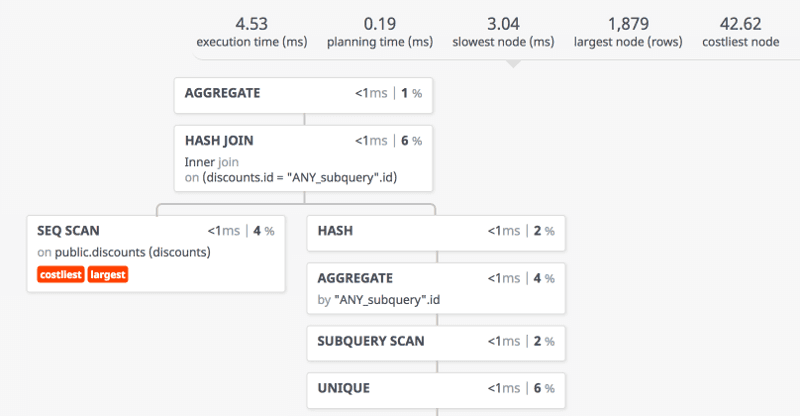
Security News
CISA’s 2025 SBOM Guidance Adds Hashes, Licenses, Tool Metadata, and Context
CISA’s 2025 draft SBOM guidance adds new fields like hashes, licenses, and tool metadata to make software inventories more actionable.
activerecord-analyze
Advanced tools
This gem adds an analyze method to Active Record query objects. It executes EXPLAIN ANALYZE on a query SQL.
You can check out this blog post for more info on how to debug and fix slow queries in Rails apps.
The following format options are supported :json, :hash, :yaml, :text, :xml. Especially the :json format is useful because it let's you visualize a query plan using a visualizer tool.

In your Gemfile:
gem 'activerecord-analyze'
The analyze method supports the following EXPLAIN query options (PostgreSQL docs reference):
buffers: [ boolean ]
verbose: [ boolean ]
costs: [ boolean ]
settings: [ boolean ]
timing: [ boolean ]
summary: [ boolean ]
format: { :text | :json | :xml | :yaml | :pretty_json }
You can execute it like that:
puts User.all.analyze(
format: :pretty_json, # :pretty_json format option generates a formatted JSON output
verbose: true,
costs: true,
settings: true,
buffers: true,
timing: true,
summary: true
)
# EXPLAIN (FORMAT JSON, ANALYZE, VERBOSE, COSTS, SETTINGS, BUFFERS, TIMING, SUMMARY)
# SELECT "users".* FROM "users"
# [
# {
# "Plan": {
# "Node Type": "Seq Scan",
# "Parallel Aware": false,
# "Relation Name": "users",
# "Schema": "public",
# "Alias": "users",
# "Startup Cost": 0.00,
# "Total Cost": 11.56,
# "Plan Rows": 520,
# "Plan Width": 127,
# "Actual Startup Time": 0.006,
# "Actual Total Time": 0.007,
# "Actual Rows": 2,
# "Actual Loops": 1,
# "Output": ["id", "team_id", "email"],
# "Shared Hit Blocks": 1,
# "Shared Read Blocks": 0,
# "Shared Dirtied Blocks": 0,
# "Shared Written Blocks": 0,
# "Local Hit Blocks": 0,
# "Local Read Blocks": 0,
# "Local Dirtied Blocks": 0,
# "Local Written Blocks": 0,
# "Temp Read Blocks": 0,
# "Temp Written Blocks": 0,
# "I/O Read Time": 0.000,
# "I/O Write Time": 0.000
# },
# "Settings": {
# "cpu_index_tuple_cost": "0.001",
# "cpu_operator_cost": "0.0005",
# "cpu_tuple_cost": "0.003",
# "effective_cache_size": "10800000kB",
# "max_parallel_workers_per_gather": "1",
# "random_page_cost": "2",
# "work_mem": "100MB"
# },
# "Planning Time": 0.033,
# "Triggers": [
# ],
# "Execution Time": 0.018
# }
# ]
Optionally you can disable running the ANALYZE query and only generate the plan:
User.all.analyze(analyze: false)
# EXPLAIN ANALYZE for: SELECT "users".* FROM "users"
# QUERY PLAN
# ----------------------------------------------------------
# Seq Scan on users (cost=0.00..15.20 rows=520 width=127)
You can also use a raw SQL query string to generate an EXPLAIN ANALYZE output:
query = "SELECT * FROM users WHERE email = 'email@example.com'"
puts ActiveRecordAnalyze.analyze_sql(query, { format: :json })
# [
# {
# "Plan": {
# "Node Type": "Seq Scan",
# "Parallel Aware": false,
# "Relation Name": "users",
# "Alias": "users",
# "Startup Cost": 0.00,
# "Total Cost": 18.75,
# "Plan Rows": 4,
# "Plan Width": 88,
# "Actual Startup Time": 0.010,
# "Actual Total Time": 0.018,
# "Actual Rows": 0,
# "Actual Loops": 1,
# "Filter": "((email)::text = 'email@example.com'::text)",
# "Rows Removed by Filter": 0
# },
# "Planning Time": 0.052,
# "Triggers": [
# ],
# "Execution Time": 0.062
# }
# ]
This feature is helpful in analyzing SQL queries extracted from the logs.
It is a bit experimental and can break with new Rails release.
FAQs
Unknown package
We found that activerecord-analyze demonstrated a not healthy version release cadence and project activity because the last version was released a year ago. It has 1 open source maintainer collaborating on the project.
Did you know?

Socket for GitHub automatically highlights issues in each pull request and monitors the health of all your open source dependencies. Discover the contents of your packages and block harmful activity before you install or update your dependencies.

Security News
CISA’s 2025 draft SBOM guidance adds new fields like hashes, licenses, and tool metadata to make software inventories more actionable.

Security News
A clarification on our recent research investigating 60 malicious Ruby gems.

Security News
ESLint now supports parallel linting with a new --concurrency flag, delivering major speed gains and closing a 10-year-old feature request.